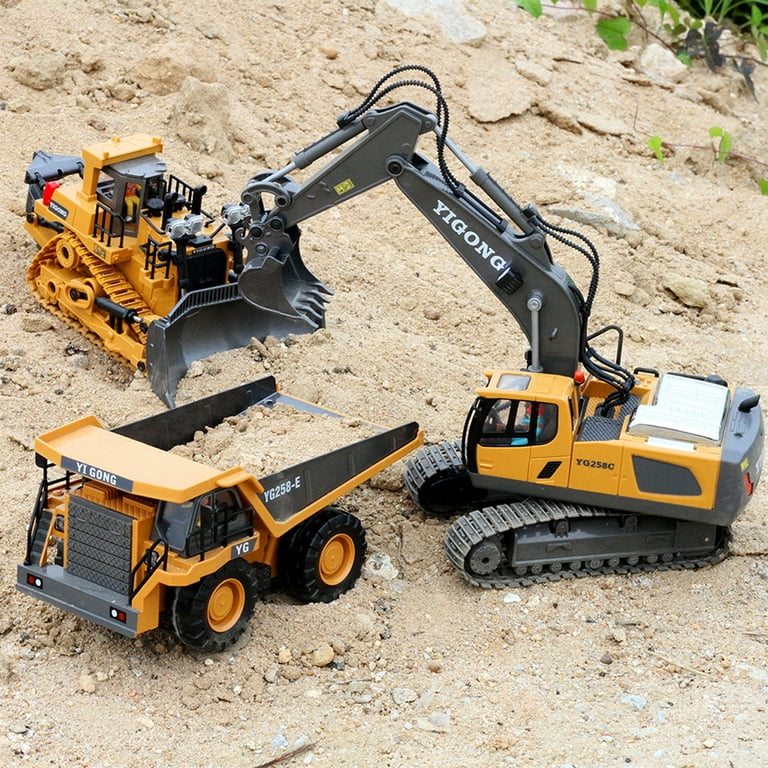Discover the Relevance of Excavator in Modern Construction Projects
Excavators are vital devices in modern building projects. Their versatility permits them to execute a broad range of tasks, from digging and grading to demolition and site preparation. Advanced functions, such as hydraulic add-ons and GPS, improve their capacities and efficiency on task sites. As the industry evolves, the relevance of excavators expands also a lot more. Comprehending their role can reveal insights into the future of building and construction practices. What exists in advance for these makers?
The Convenience of Excavators in Various Projects
Excavators are commonly associated with massive construction projects, their versatility allows them to be made use of in a large variety of applications, from property landscaping to utility maintenance. In urban setups, excavators can navigate tight spaces to dig structures for homes or set up water drainage systems. Their capability to carry out delicate jobs makes them optimal for landscaping tasks, where they can dig deep into for ponds or plant trees. Furthermore, excavators play a necessary role in utility upkeep, successfully excavating trenches for pipes or wires without disrupting bordering locations. In farming applications, they help in land clearing and dirt preparation. Furthermore, their versatility allows them to be outfitted with different accessories, improving their performance throughout different jobs. This diverse nature of excavators not only simplifies numerous building and construction procedures yet likewise demonstrates their integral role in modern-day facilities advancement and upkeep.
Secret Functions and Kinds of Excavators
The discussion on vital features and sorts of excavators highlights the necessary qualities that make these makers vital in construction. Different excavator types, each created for specific tasks, show their adaptability and efficiency across different applications. rc excavator. Understanding these classifications and functions is vital for optimizing their use in modern-day construction projects
Excavator Keys In Review
Excavators play an essential role in contemporary building, using adaptability and effectiveness throughout various tasks. These heavy equipment units can be found in several types, each customized for details applications. The most typical types consist of spider excavators, recognized for their security on irregular terrain, and rolled excavators, which give greater wheelchair on paved surface areas. Small excavators are favored for small-scale projects and tight spaces, while long-reach excavators are designed for deep digging. Additionally, there are specialized excavators, such as hydraulic excavators, which boost power and precision. Each type features distinct abilities, making them important for tasks varying from digging and grading to demolition and product handling. Understanding these variations permits building and construction professionals to pick the appropriate excavator for their task requires.
Secret Features Explained
Understanding the key attributes of excavators boosts their effective application in construction jobs. Excavators are characterized by their effective hydraulic systems, which offer the essential force for excavating, lifting, and moving products. Their articulated arms permit for a vast array of movement, helping with accurate procedures in confined rooms. Furthermore, the variety of add-ons, such as buckets, grapples, and augers, increases their flexibility to satisfy various project needs. The dimension and weight of excavators likewise add to their security and ability to move on different surfaces. Additionally, innovations in innovation have actually resulted in the integration of GPS and automation, enhancing precision and efficiency in excavation jobs. These attributes collectively position excavators as indispensable devices in contemporary construction.
Applications in Construction
Transforming building and construction websites, excavators play a pivotal function across various applications, ranging from property structure projects to massive framework developments. These flexible equipments are outfitted for jobs such as digging foundations, trenching for utilities, and site grading. Different types of excavators, consisting of spider, wheeled, and mini excavators, supply specific advantages tailored to the project requirements. Crawler excavators stand out in harsh surfaces, while rolled excavators offer flexibility on smooth surface areas. Tiny excavators are perfect for restricted rooms, making them preferred in urban setups. The effectiveness and power of excavators significantly accelerate building and construction procedures, making certain prompt task completion. Their adaptability even more boosts their relevance, enabling building teams to tackle a diverse variety of difficulties successfully.
Enhancing Effectiveness and Productivity on Task Sites
Making the most of performance and performance on work sites is an important goal in modern construction. Excavators play a critical role in achieving this objective by enhancing various tasks. Their ability to perform numerous features-- such as lifting, digging, and grading-- reduces the demand for additional tools, consequently conserving time and resources.Moreover, excavators improve workflow by permitting faster completion of tasks. With innovative functions like hydraulic add-ons and general practitioners innovation, they can perform precise procedures that lessen mistakes and revamp. This accuracy not only boosts the top quality of work yet likewise optimizes product usage, adding to cost savings.The flexibility of excavators permits them to adapt to different site problems, making certain that projects advance efficiently no matter of challenges. By incorporating excavators right into construction processes, teams can substantially enhance their overall productivity, leading to timely task completion and raised productivity.
Security Advantages of Using Excavators
Excavators significantly enhance security on building and construction sites with enhanced operator visibility and lowered manual labor risks. By offering drivers with a clear sight of their environments, excavators aid to avoid injuries and mishaps. Furthermore, the equipment lessens the need for employees to involve in harmful hand-operated jobs, additionally promoting a safer work environment.
Enhanced Operator Visibility
Although building websites can be disorderly and full of possible risks, improved operator visibility plays an essential role in ensuring security when utilizing excavators. Modern excavators are designed with large, unhampered home windows and purposefully positioned mirrors, permitting drivers to maintain a clear sight of their environments (rc excavator). This enhanced exposure is essential for spotting pedestrians, other machinery, and numerous obstacles, considerably lowering the threat of accidents. In addition, lots of excavators include sophisticated technology, such as sensors and electronic cameras, to provide drivers with extra perspectives, even more enhancing recognition. The capability to see more plainly not just aids in reliable operation yet additionally promotes a more secure workplace, making it less complicated for operators to browse complicated construction websites without compromising safety and security requirements
Reduced Manual Work Threats
When manual work is decreased through making use of excavators, numerous security advantages emerge, markedly improving the health of building employees. Excavators reduce the physical pressure related to heavy training and repeated jobs, properly reducing the danger of musculoskeletal injuries. By automating procedures such as digging, grading, and relocating products, they allow employees to keep a more secure range from possible threats. Additionally, excavators are geared up with innovative security attributes, such as rollover protection systems and improved operator functional designs, which further safeguard personnel on site. The result is a considerable decrease in work environment accidents and injuries, resulting in increased efficiency and morale among building groups. Eventually, the fostering of excavators adds to a more secure and more effective building environment.
Excavators in Earthmoving and Website Prep Work
In modern-day building, a considerable portion of earthmoving and site preparation jobs check my reference depends on the performance and convenience of excavators. These makers are developed to deal with various soil kinds and surface, making them crucial for rating, digging, and trenching activities. Their hydraulic arms can be geared up with different attachments, such as augers and pails, permitting drivers to tailor their approach based upon details project requirements.Excavators excel at relocating large volumes of planet promptly and successfully, which increases the general building timeline. They can navigate limited spaces and testing websites where conventional tools may struggle, improving productivity. In addition, the accuracy of excavators assurances that website preparation follows rigorous specifications, reducing the threat of errors that can result in costly rework.
The Function of Excavators in Demolition Tasks
Excavators play a crucial function in demolition jobs, as they possess the power and dexterity required to take apart structures efficiently. Geared up with different accessories such as hydraulic breakers, shears, and grapples, these makers can adapt to various demolition demands, whether for small buildings or big industrial websites. Their flexibility makes it possible for operators to deal with intricate tasks while maintaining security and precision.In addition to their demolition abilities, excavators promote debris removal, guaranteeing that job sites continue to be secure and orderly. By damaging down structures into workable pieces, they enable structured clearing and recycling of products, aligning with modern sustainability efforts.Moreover, excavators can access limited areas and navigate unequal terrain, making them vital in city demolition projects. In general, their robust layout and multifunctionality make excavators a vital asset in the demolition stage of construction, contributing considerably to job timelines and efficiency.


Future Fads in Excavator Modern Technology and Usage
As the building and construction industry progresses, advancements in excavator technology are positioned to change their use and effectiveness considerably. One substantial fad is the assimilation of automation and expert system, permitting excavators to run with marginal human intervention. This shift will improve accuracy in jobs such as grading and trenching, minimizing human mistake and raising productivity.Additionally, the surge of electrical and hybrid excavators is shaping an extra lasting building and construction setting, decreasing carbon discharges and fuel costs. Improved telematics systems are additionally emerging, enabling real-time tracking of equipment performance and upkeep demands, which can cause much better operational efficiency and longer tools lifespan.Moreover, advancements in add-on technology are increasing the flexibility of excavators, allowing them to carry out a broader array of tasks. The mix of these patterns shows a future where excavators are smarter, greener, and a lot more adaptable, ultimately improving building site web and construction project dynamics.
Often Asked Concerns
Just How Do Excavators Contrast to Other Building And Construction Machinery?
Excavators, identified by their adaptability and power, succeed in digging and earthmoving contrasted to other machinery. Their ability to carry out different jobs, consisting of lifting and demolition, makes them indispensable in building and construction jobs, boosting general efficiency.

What Is the Average Life Expectancy of an Excavator?
The typical life-span of an excavator usually varies from 7,000 to 10,000 operating hours, depending upon upkeep, use problems, and version. Appropriate care can prolong this life-span, ensuring peak efficiency throughout its operational years.
Just How Are Excavators Preserved for Ideal Efficiency?
Excavators call for routine upkeep for peak performance, consisting of regular evaluations, liquid checks, filter substitutes, and prompt repair work. Carrying out a precautionary maintenance timetable aids extend their life expectancy and guarantees reliable operation in numerous construction settings.
What Are the Prices Associated With Leasing vs. Buying an Excavator?
The costs associated with purchasing an excavator versus renting vary substantially. Renting deals reduced upfront expenses however can collect with time, while purchasing needs a significant preliminary investment, yet gives long-term financial savings and property possession advantages.
What Training Is Required to Run an Excavator?
Operating an excavator calls for specialized training, commonly consisting of safety and security methods, machine procedure strategies, and ecological understanding. Accreditation programs usually mandate sensible experience, enabling drivers to deal with various tasks successfully while making certain compliance with industry guidelines. The most typical types include crawler excavators, recognized for their stability on unequal surface, and rolled excavators, which give higher wheelchair on smooth surface areas. Small excavators are preferred for small-scale jobs and tight spaces, while long-reach excavators are created for deep digging. Furthermore, there are customized excavators, such as hydraulic excavators, which enhance power and accuracy. Various kinds of excavators, including crawler, wheeled, and mini excavators, provide details advantages learn the facts here now tailored to the task requirements. Spider excavators stand out in rough terrains, while wheeled excavators offer movement on smooth surface areas.